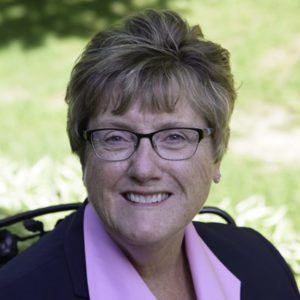NWRA Hall of Fame: Kathy Trent
Kathy Trent is known among her peers in the solid waste field as someone who works to ensure the industry voice is not only heard but respected. As a government affairs director for Waste Management, Trent is heavily involved in helping local communities, government officials and others understand what the waste and recycling industry is doing and why, so that the industry can continue pushing forward with its environmental initiatives.
“I’m really proud of the fact that my work with Waste Management has allowed me to make sure the industry’s voice is heard and that our customers’ voices are heard,” says Trent. “It has been that way since I started with the company, and it’s a real privilege of mine to work in this industry.”
Trent began working at Waste Management in 1981, serving as an environmental specialist handling mostly permitting and regulations as well as site-specific work for some of the company’s facilities in Ohio that had a lot of regulatory oversight. In this position, she was able to combine her passion of science with her enjoyment of working with regulations and learn new skills that would later be useful in other roles.
In the late 80s-early 90s, for example, Trent utilized her expanded knowledge of the industry to enter the government affairs arena. She worked to help implement legislation such as Subtitle D in Ohio and Kentucky, and then went on to help assist with the passage of Slow Down to Get Around legislation in Ohio and Kentucky; work on agency understanding of elevated temperature landfills; fight legislation opposing permit moratoriums, increased solid waste fees, flow control restrictions, etc.; work on rules governing special waste streams like infectious waste; help regulate construction and demolition debris disposal and processing in Ohio; and help with agency guidance on ending post-closure care aligning with technical standards being developed by the industry.
All of those tasks didn’t come easy, however. In order to communicate clearly and speak as a voice of the waste and recycling sector, Trent had to learn the ins and outs of the industry, which she found quite challenging in the beginning of her career.
“When I was first starting out, I knew very little about the industry and the operations of Waste Management, but I found out over time that the company was willing to explain things to me and make sure I understood how they ran their business from an operations standpoint,” explains Trent. “The people I worked with at the time were very open about expressing their concerns and ideas and that helped me along the way.”
Some of those people quickly became mentors to Trent. George Vander Velde, vice president of Chemical Waste Management, helped her learn how to deal with the financial and operational concerns of the company, and Dennis Wilt, Midwest general counsel at Waste Management, helped Trent land a seat at the table alongside other area leaders to work on legislative, regulatory and community issues. Trent’s biggest mentor, however, is the company of Waste Management, which she says has provided her with the tools she has needed to achieve her goals.
“The industry is like a family, and it’s very rewarding,” says Trent. “You meet a lot of great individuals along the way who do amazing things and who strive to do better. I’ve had a lot of great bosses at Waste Management who really listened and helped articulate how we can work better as a whole to achieve common goals.”
Now, with more than 30 years of experience under her belt, Trent is serving as a mentor for current and future waste and recycling industry workers. She is actively involved in the National Waste & Recycling Association (NWRA) Women’s Council, which she helped found in 2003, and she serves as the Ohio chapter chair and a Board of Governors representative.
Over the years, she has helped the Women’s Council raise and award more than $200,000 in scholarships, and she has developed and addressed the legislative and regulatory needs of NWRA chapter members.
These efforts, along with many others, recently led her to be inducted into the NWRA Hall of Fame, an honor that “means the world” to Trent.
“I am most proud to be a wife and a mother, but when I look back over the years, I’m very proud to have worked for an industry that’s inclusive and that cares for the environment. I’m also proud that I was able to advocate well on behalf of the members and help keep our industry operating safely. I really couldn’t have done any of it if I hadn’t been working for a company like Waste Management.”
Looking toward the future, Trent is excited about the potential technology has to improve the industry. “From robots in MRFs [materials recovery facilities] to enhanced technology in trucks to help drivers, technology is going to be a big part of what we do in the future, and I’m very privileged to be a part of it,” she says.

